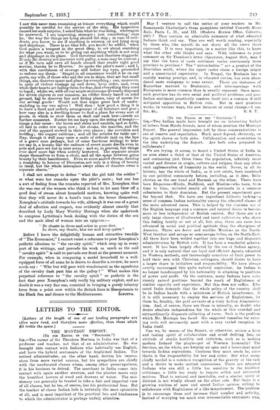LETTERS TO THE EDITOR..
[Letters of the length of one of our Leading paragraphs are often more read, and therefore more effective, than those which fill treble the space.]
THE MONTAGU REPORT.
(To THE EDITOR OF THE " SPECTATOR."]
SIH,—The career of Sir Theodore Morison in India was that of a professor and teacher, not that of an administrator. He was brought into contact with Indians who habitually use English, and have the hybrid sentiments of the Anglicized Indian. The retired administrator, on the other hand, derives his impres- sions from more varied sources, but his sympathies are chiefly with the uneducated classes whom, among other preoccupations, it is his business to defend. The merchant in India comes into contact with again another stratum, and the planter meets only the humblest hewers of wood and drawers of water. The mis- sionary can generally be trusted to take a fair and impartial view of all classes, but he too, of course, has his professional bias. But the teacher of clever Indian lads is naturally the most optimistic of all, and is most impatient of the practical lets and hindrances to which the administrator is perhaps unduly attentive. May I venture to call the notice of your readers to Mr. Ramananda Chatterjee's three pamphlets entitled Towards Home Rule, Parts I., II., and III. (Modern Review Office, Calcutta, 1917) P They contain an admirable summary of what educated Indians think and say. They are well worth reading, especially by those who, like myself, do not share all the views there expressed. It is very important, in a matter like this, to know what the other side thinks and says. With reference to your comment on Sir Theodore's letter (Spectator, August 31st), may I say that the force of caste sentiment varies enormously from province to province ? The " untouchables " are a product of the Dravidian south, where the upper castes claim a foreign origin and a quasi-racial superiority. In Bengal, the Brahmin has a rapidly waning prestige, and, in educated circles, has even aban- doned caste endogamy to some extent. There are instances of Kayasthas married to Brahminis, and intermarriage with Europeans is more common than is usually supposed. Once more, each province has its own social and political problems, and pan- Indian sentiment practically resolves itself into a common if still mitigated opposition to British rule. But in each province works, in various ways, the new ferment of social change.—I am,


























 Previous page
Previous page